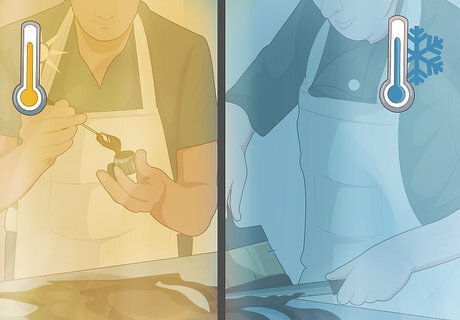
views
X
Research source
Becoming a chocolatier takes research, culinary skills, practice, experience through education and/or an apprenticeship...and lots of testing chocolate.
Studying to Become a Chocolatier

Tour a local chocolate maker. Find out if you can tour your favorite local chocolate shop or volunteer to help them for a day. Seeing a chocolatier in action will expand your knowledge of the chocolate-making process. Experiencing the work firsthand may help you decide if being a chocolatier is something you will truly love doing. If possible, ask the chocolatier or staff questions. What do they like most about their job? How did they get their business started? What is a skill they can’t do their job without?

Determine if you want to pursue certification or a degree. Formal education is usually not required if you dream of opening your own chocolate business, but a certificate or degree from your local university can help you gain experience and land an apprenticeship or job. Generally, certificates can be earned more quickly and may be less costly. On the other hand, diplomas show you’ve devoted more hours and had more formal training.

Learn about the process of chocolate-making. Technical skills include tempering, molding, dipping, candy production, and decorating. General culinary knowledge like food safety, measurements and conversions, nutrition, and using baking equipment will also come in handy. Ecole Chocolat and Callebaut both offer online chocolate-making courses that can help you with technical skills.
Building Necessary Skills

Practice making your own chocolate in different conditions. As an ingredient, chocolate can be temperamental. Factors such as room temperature and humidity can cause it to behave differently. You’ll adapt more quickly to changes by practicing chocolate-making in different conditions.

Test your own chocolate with the help of others. Testing chocolate is one of the most rewarding parts of being a chocolatier. Sample the chocolate you make to check the flavor and texture. If your goal is to run your own chocolate-making business, you’ll want to see what others think of your chocolate, so have friends and family give you honest feedback on your chocolate. But don’t forget that your own opinion of your chocolate is important too.

Sharpen your communication, flexibility and time management skills. As in any kitchen, communicating clearly with your coworkers is important if you want to do well and learn as much as you can about chocolate-making. You should have the patience for repetitive, detailed work, and be able to finish tasks under a tight deadline if necessary. Chocolatiers who do custom orders for events like birthdays and weddings have to be open to client meetings during off-hours, and special designs or types of chocolate.
Finding a Job

Network with others in the industry when you can. Go to local chocolate-related events and talk to people. Join a chocolate lovers meetup group or Facebook group, whose members might share events or job opportunities with one another. Be open and friendly; you never know when someone can connect you with a job or an apprenticeship. Local events might include chocolate-making competitions, cooking classes, wine or beer pairings, or local flea markets.

Get your foot in the door with an entry-level job. Find a job at a local chocolate shop, bakery, confectionery or restaurant. Even if the job is not directly related to being a chocolatier, there’s potential to learn both culinary technique and general skills from coworkers or leadership. You may also be able to transfer or get promoted to a position more relevant to a chocolatier.

Learn from a master chocolatier through an apprenticeship. You’ll gain real experience working under a professional chocolatier that can be very different from what is taught in culinary courses or schools. Aspiring chocolatiers will learn hands-on techniques and craft from a master chocolatier. You can also get feedback from a professional on your own handcrafted chocolate.




















Comments
0 comment